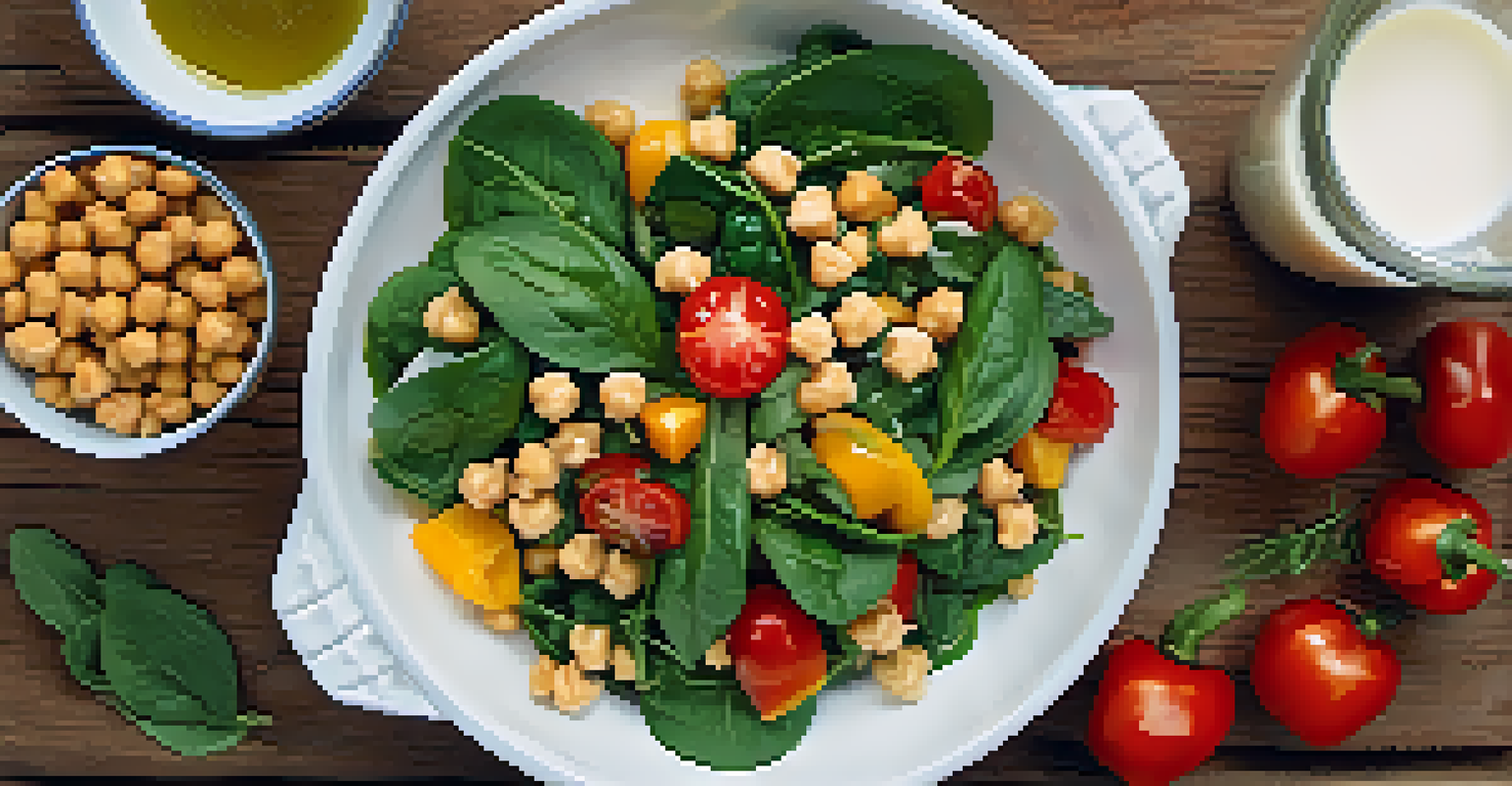Essential Vitamins and Minerals Found in Vegetarian Diets

Understanding the Importance of Vitamins and Minerals
Vitamins and minerals are vital nutrients that our bodies need to function correctly. They play critical roles in everything from immune support to energy production. For those following a vegetarian diet, understanding these nutrients can help ensure they meet their dietary needs.
Let food be thy medicine and medicine be thy food.
Each vitamin and mineral serves a unique purpose, such as Vitamin C supporting skin health or calcium contributing to strong bones. A well-planned vegetarian diet can provide these essential nutrients, but awareness is key. By knowing which foods contain these vitamins and minerals, vegetarians can make informed choices.
Incorporating a variety of plant-based foods can help achieve a balanced intake. It’s not just about eating vegetables; whole grains, nuts, and legumes all contribute to nutrient diversity. Let’s dive deeper into the essential vitamins and minerals that vegetarians should pay attention to.
Vitamin B12: The Critical Nutrient for Vegetarians
Vitamin B12 is often a concern for those on vegetarian diets since it's primarily found in animal products. This vitamin is crucial for red blood cell formation and neurological function. A deficiency can lead to fatigue and neurological issues, making it essential for vegetarians to monitor their intake.

Luckily, there are vegetarian-friendly sources of B12, such as fortified cereals, plant-based milk, and nutritional yeast. Supplementation is another option many vegetarians consider to maintain adequate levels. Understanding your B12 sources can make a significant difference in overall health.
Key Nutrients for Vegetarians
Vegetarians need to be aware of essential vitamins and minerals like B12, iron, and calcium to support their health.
Regularly checking B12 levels through blood tests can help ensure you’re getting enough. If you’re unsure about your intake, consulting with a healthcare provider can provide personalized guidance. Keeping B12 in check can help you feel your best on a vegetarian diet.
Iron: Essential for Energy and Vitality
Iron is another nutrient that vegetarians need to pay attention to, as it’s found in two forms: heme and non-heme. Heme iron, which is more easily absorbed by the body, is primarily found in animal products. Non-heme iron is found in plant foods like lentils, beans, and spinach, but it’s less readily absorbed.
You are what you eat, so don’t be fast, cheap, easy, or fake.
To boost iron absorption from plant sources, pairing them with vitamin C-rich foods can be effective. For instance, adding bell peppers or citrus fruits to a spinach salad can enhance iron uptake. This simple trick can help vegetarians maintain their energy levels.
Additionally, cooking methods can also affect iron availability. For example, using cast iron cookware can increase the iron content of food. Being mindful of these factors can help ensure you’re getting enough iron from your vegetarian diet.
Calcium: Building Strong Bones Without Dairy
Calcium is often associated with dairy products, but there are plenty of plant-based sources available for vegetarians. This mineral is essential for bone health, muscle function, and nerve signaling. Leafy greens, fortified plant milks, and tofu are excellent sources of calcium that can easily fit into a vegetarian diet.
Incorporating a variety of these foods can help ensure you meet your calcium needs. Moreover, pairing calcium-rich foods with vitamin D can enhance calcium absorption. Many vegetarians choose fortified foods or supplements to boost their vitamin D levels.
Diverse Diet Enhances Nutrient Intake
Incorporating a variety of plant-based foods, such as whole grains, legumes, and nuts, can help ensure a balanced nutrient intake.
Getting adequate calcium is crucial, especially for those at risk of osteoporosis. Regular weight-bearing exercises can also help maintain bone density. By combining dietary sources with healthy habits, vegetarians can support their bone health effectively.
Zinc: Supporting Immune Function Naturally
Zinc is a trace mineral that plays a crucial role in immune function, wound healing, and DNA synthesis. While meat is a significant source of zinc, there are plenty of vegetarian options available. Foods like pumpkin seeds, chickpeas, and quinoa can help vegetarians meet their zinc needs.
However, it’s worth noting that the body absorbs zinc from plant sources less efficiently than from animal sources. To improve absorption, vegetarians can soak or sprout legumes and grains. This simple preparation technique can make a noticeable difference in nutrient availability.
Including a variety of zinc-rich foods in your diet can help support overall health. If you're concerned about your zinc levels, a healthcare provider can offer testing and advice tailored to your needs. Staying proactive about zinc intake can bolster your immune system and overall vitality.
Omega-3 Fatty Acids: Essential for Heart and Brain Health
Omega-3 fatty acids are crucial for heart and brain health, but they are primarily found in fish. For vegetarians, flaxseeds, chia seeds, and walnuts are excellent plant-based sources of omega-3s. These foods can help maintain cardiovascular health and support cognitive function.
Incorporating these seeds into smoothies, salads, or baked goods can easily boost your omega-3 intake. Additionally, some vegetarians may consider algae-based supplements as a direct source of DHA and EPA, the most beneficial forms of omega-3s. This can be particularly helpful for those who may not consume flaxseeds or chia seeds regularly.
Supplementation and Planning Matter
Regular check-ups and thoughtful meal planning can help vegetarians effectively manage their nutritional needs.
Being aware of omega-3 sources can help vegetarians maintain optimal health. Regularly including these foods in your diet can contribute to long-term well-being. With a little planning, ensuring adequate omega-3 intake can be simple and effective.
Vitamin D: The Sunshine Vitamin for Vegetarians
Vitamin D is often called the 'sunshine vitamin' because our skin produces it when exposed to sunlight. However, for vegetarians, it can be a bit tricky to obtain sufficient amounts, especially during the winter months. Fortified foods, such as plant-based milk and cereals, can help fill the gap.
Additionally, mushrooms exposed to UV light can also provide a vegetarian-friendly source of vitamin D. Regularly including these foods can help ensure you’re getting enough of this important nutrient. Many vegetarians also consider supplements, especially if they have limited sun exposure.

Maintaining adequate vitamin D levels is important for bone health and immune system function. Regular check-ups with a healthcare provider can help manage vitamin D levels effectively. By staying informed, vegetarians can take proactive steps to support their health.
Putting It All Together: A Balanced Vegetarian Diet
Creating a balanced vegetarian diet involves being mindful of these essential vitamins and minerals. By diversifying your food choices, you can ensure a nutrient-rich intake that supports overall health. Regularly including fruits, vegetables, whole grains, legumes, nuts, and seeds will provide a wide array of nutrients.
Planning meals with a focus on these essential nutrients can make a significant difference. Keeping a food diary can help track your intake and identify any potential gaps. This approach allows you to adjust your diet as needed and ensures all nutritional needs are met.
Ultimately, being a vegetarian doesn’t mean compromising on health. With a little planning and knowledge, you can enjoy a fulfilling and nutritious vegetarian lifestyle. Empowering yourself with information can lead to better health and well-being.